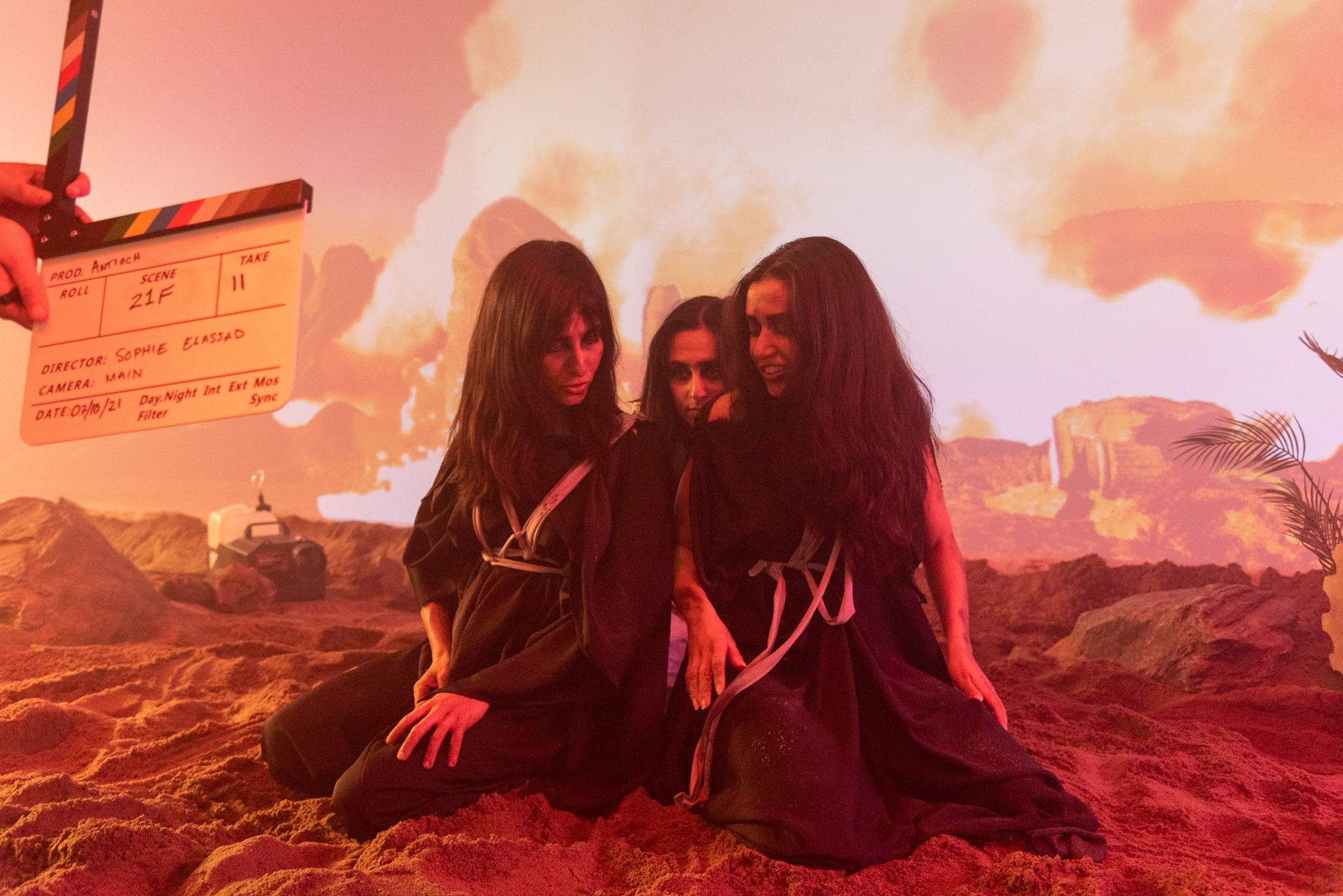Talisman Theatre’s new creation raises questions on representation of non-Western identities
Antioch is a digital theatre performance presented by Talisman Theatre. The show is a translated adaptation of the French text Antioche by author Sarah Berthiaume. The English version, directed by Sophie El Assaad, is driven by a desire to provide a more accurate representation of the Middle Eastern characters in the play through a story that details the communication struggles between an immigrant mother and her daughter. Presented on YouTube, the work is also an exploration of new digital possibilities for live art creations. The result is a powerful immersive theatre reading that invites viewers to engage with the performance while being comfortably seated and wearing a pair of headphones.
Antioch tells the story of Inas, her daughter Lily, and the archetypal figure of Antigone. Nora Guerch plays Inas, an immigrant and single parent troubled by her past. Interviewed by phone, Guerch explained that she was profoundly touched to play this multi-layered character. The actor described Inas as “a complex women who is profoundly full of a memory that she doesn’t want to face.”
Lily, played by Mona Maarabani, constantly rethinks the society and the world she lives in. Full of frustration, the teenager shares her thoughts with her friend Antigone, who died 2,500 years ago in her own Greek tragedy. They criticize the world together. Cara Rebecca plays a version of Antigone, who wears her toga despite the modern era she exists in, while also eating gummies. The character narrates the interactions between Lily and Inas . Lily also develops another relationship, this one through the internet. She chats with H, played by Ismail Zourhlal, a guy who lives on the other side of the world and shares her anger towards the system.
Lily and Inas live in the same reality, but it is shaped by their own experiences: Inas immigrated to North America to find a better life, and sees it as a place of opportunity while Lily suffocates in the Western lifestyle. Antioch examines their contradictory visions and how they can finally come together.
The line between fiction and reality is blurred, letting the viewers decide for themselves what is real or not. The abstraction present in the work is complemented by the visual identity created by Emily Soussana and Andrew Scriver’s multimedia company potatoCakes_digital. For Antioch, they created different settings where the action takes place. Throughout the work, digital effects are implemented and add layers of meaning to the text.
Jesse Ash is the sound designer for the piece. He also worked in collaboration with music consultant Skander Cherif to develop sound propositions that are truthful to the Middle Eastern characters of Antioch. When listening to the piece, viewers are encouraged to wear headphones to fully experience the sonic ambiance. The soundscape was created in a way that allows the listener to feel as though they were in the room with the actors.
For Guerch, this experimental reading is a rich experience. She believes that digital theatre propositions like Antioch birth new possibilities for live art . “Arts evolve with time and that is an outgrowth of theatre that was born. It is not theatre. It is a child of theatre. […] It comes from theatre, but it unfolds through listening to the moment’s necessities,” she said.
The mission of the Talisman Theatre company is to translate Quebecois theatre pieces in order to make them accessible to an anglophone audience. For this project, they went beyond simple linguistic translation. They also worked with director Sophie El Assaad to adapt the text to make it closer to the Middle Eastern realities it depicts.
El Assaad has worked in the theatre field since 2015 and focused mostly on costume and set design. Antioch is one of her first directing experiences. Prior to working as the director of the piece, she did a lot of research related to the themes tackled in Antioch. For El Assaad, who is Lebanese and grew up in Bahrain, a country in the Persian Gulf, this work also relates to her personal artistic research.
“It is rare that I get to work on shows that pertain to my culture, and as an artist, in my personal practice, I am actively researching ways in which I can bring in aesthetics and ways of working that aren’t necessarily Western. I want to learn more about my identity, and I want to bring that in through my art, so doing the research for this project allowed me to do the research for my own practice,” she said.
For El Assaad, the project is also about having conversations that do not happen often enough. “We are all learning how to exist as a multicultural, diverse community, and so I saw this project as a way […] of having these very important discussions that don’t happen enough,” she said.
The showing is followed by a roundtable discussion featuring five artists. El Assaad is accompanied by Fuad Ahmed, Ghassan Zakarya, Hoda Adra, and Aquil Virani to discuss the issue with representation of non-Western realities by Western playwrights based on their reading of the original version of Antioche, as well as their personal experiences.
This conversation adds to the multiple layers of meaning present in Antioch. The profoundly touching theatre reading is described by El Assaad as a story on the power of vulnerability. This openness gives Lily and Inas the opportunity to come together while trying to understand each other.
“For me, this piece isn’t about strength in the typical way, but it is about seeing how being vulnerable is actually being strong, and actually being able to compromise, and being able to let your guard down, and being able to let your weaknesses show. That’s so strong and that’s what power is,” El Assaad said.
Photo courtesy Surah Field-Green




